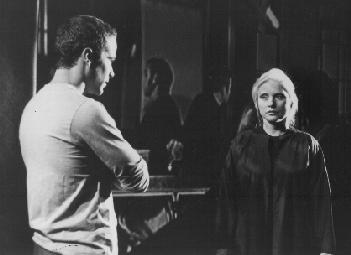SEARCH CurtainUp
REVIEWS
FEATURES
NEWS (Etcetera)
ADDRESS BOOKS
Broadway
Off-Broadway
BOOKS and CDs
OTHER PLACES
Berkshires
London
Los Angeles
Philadelphia
Elsewhere
QUOTES
On TKTS
LETTERS TO EDITOR
FILM
LINKS
MISCELLANEOUS
Free Updates
Masthead
NYC Weather
Crave
by Les Gutman
|
Do you ever hear voices?. . . Only when they talk to
me. ---Sarah Kane |

Deborah Harry (Photo: Dixie Sheridan)
|
Imagine yourself on a dark street corner in the West Village. Perhaps the one on Sheridan Square near Axis Theater's sleek, comfortable home (formerly the decrepit home of Ludlam's Ridiculous Theatre). There are four people, apparently two couples, within earshot. All of them are talking: sometimes to their putative partner, sometimes, it seems, to no one in particular, or perhaps it's to anyone who will listen to their anxious expressions of what sound like yearning or despair.
We all succumb to the temptation to eavesdrop like this. It's usually brief, and we have to rely on our imagination to fill in the blanks: to wonder a bit more than we need to about these people, what's going on in their lives and in their minds. An older (but not old) woman and a younger man; a younger woman, and an older man: what's their story? who's in pursuit? what baggage do they carry with them?
Now imagine that serendipity steps in, and these conversations coalesce in a strikingly poetic way, a fantasia of love, lust, pain, humor, sadness, hope, resignation.... What we hear remains random, much as what we see in their faces is obscured by shadow.
This, roughly, is the nature of Sarah Kane's luxuriously dark Crave.
Ms. Kane killed herself last year in a mental hospital at age 28. Her first ever New York production (five of her plays, including this one, have appeared in the UK) leaves little doubt why. Described as the calmest of her works, it lacks the horrific violence of her earlier plays (which some critics found physically sickening) even as it posits death as a plausible condition to which one might aspire in the face of emotional disintegration. Kane has left a searing footprint.
Purely from a crafting standpoint, Crave is a stunning achievement: lyricism woven into a symphony of voices without sacrificing authenticity. "There is a difference between articulacy and intelligence," one of the characters, B (David Guion), says. Kane, it seems, knew how to find the common ground.
Crave deals in emotions that, by nature, don't play out in linear fashion, so its ellipses are not surprising. Still, Randy Sharp, who has placed Crave in a distinctly New York aesthetic (that, thankfully, spares us another experience of American actors playing Brits badly) finds in the prevailing minimalism a surprising but familiar naturalism through which to channel Ms. Kane's often-rhythmic shards of language. Less successful are the battery of video monitors Sharp has suspended from the ceiling and on which she displays clips (finely shot and edited by Mott Hupfel and Mike Huetz, respectively) presumably from the characters' minds' eyes. Employing multimedia in this way is a pet technique of Ms. Sharp; it may have worked when she used it with Beckett (to whom Kane can obviously be compared), but this is a case where less would have been more.
And in particular the "more" would have been less diverted attention from the four stunning performances. Deborah Harry, as M (all four characters are identified only by a single letter), is perfectly cast as the older woman: hard-edged but vulnerable, worn but still sensual. Her cross-over from rock star to actor is no gimmick: she inhabits her fragile character to the core. As her younger man, Guion is fine (as is Kristin DiSpaltro as the young woman, C). But it is Brian Barnhart, as A, the only character given a long monologue, who sticks in our memory for his forceful yet shattered performance.
It's more or less obligatory to close by saying how unfortunate it is that we will be deprived of Ms. Kane's future greatness. But the sense of Crave is so integral to her own life, and death, that it seems more reasonable just to say we should be grateful for what we were granted.
| CRAVE
by Sarah Kane Directed by Randy Sharp with Brian Barnhart, Kristin DiSpaltro, David Guion and Deborah Harry Set Design: David Ramirez Lighting Design: David Zeffren Costume Design: Mark Spada Sound Design: Steve Fontaine Film: Mott Hupfel edited by Mike Huetz Running time: 1 hour with no intermission Axis Theater, 1 Sheridan Square (east of 7th Av.) (212) 807-9300 Opened 11/8/2000 closes 12/23/2000 Weds. - Sat. @8PM; $25 Reviewed by Les Gutman based on 11/9 performance |


